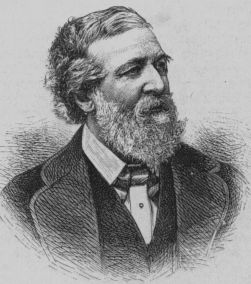Frases célebres de Robert Browning
“Parecemos tan libres y ¡estamos tan encadenados!”
Fuente: El amigo de todos: 4,850 pensamientos clasificados y 700 refranes explicados. Compilado por Victor Quintanilla Young, Vilma Elvira C. de Quintanilla.
“Ama de verdad un solo día y el mundo habrá cambiado.”
Fuente: Cabestrero Rodríguez, Teófilo. Jesús, el hombre que ama como Dios. Editorial Desclée De Brouwer, 2015. ISBN 9788433037282. https://books.google.es/books?id=4svyDQAAQBAJ&pg=PT37&dq=Ama+un+solo+d%C3%ADa+y+el+mundo+habr%C3%A1+cambiado&hl=es&sa=X&ved=0ahUKEwibqpqElK_gAhWOlhQKHYS4AAUQ6AEIMjAC#v=onepage&q=Ama%20un%20solo%20d%C3%ADa%20y%20el%20mundo%20habr%C3%A1%20cambiado&f=false
“Cuando la lucha del hombre empieza dentro de sí, ese hombre vale algo.”
Fuente: Palomo Triguero, Eduardo. Cita-logía. Editorial Punto Rojo Libros,S.L. ISBN 978-84-16068-10-4. p. 154.
Fuente: Eusebio, Sebastián Arribas. Enciclopedia básica de la vida. Cultivalibros. 2010. ISBN 978-84-99233-42-0. p. 37.
Frases de hombres de Robert Browning
“El hombre busca su bien a costa del mundo entero.”
Fuente: Amate Pou, Jordi. Paseando por una parte de la Historia: Antología de citas. Editorial Penguin Random House Grupo Editorial España, 2017. ISBN 9788417321871. p. 56.
“La culpa la tiene sólo el tiempo. Todos los hombres se tornan buenos, pero ¡tan despacio!”
Fuente: Hernández Bitor, Miguel Ángel. Confesiones desde el otro lado. Editorial Visión Libros, 2006. ISBN 9788498213935. p. 7. https://books.google.es/books?id=IPo6DwAAQBAJ&pg=PA7&dq=La+culpa+la+tiene+s%C3%B3lo+el+tiempo.+Todos+los+hombres+se+tornan+buenos,+pero+%C2%A1tan+despacio!&hl=es&sa=X&ved=0ahUKEwitzvHdma_gAhUS1uAKHRc5C2EQ6AEIMzAC#v=onepage&q=La%20culpa%20la%20tiene%20s%C3%B3lo%20el%20tiempo.%20Todos%20los%20hombres%20se%20tornan%20buenos%2C%20pero%20%C2%A1tan%20despacio!&f=false
“Lo que ennoblece al hombre no es un acto, sino un deseo.”
Fuente: Ortega Blake, Arturo. El gran libro de las frases célebres. Editorial Penguin Random House Grupo Editorial México, 2013 ISBN 978-60-7311-631-2.
“Yo sostengo que un hombre
Tiene que luchar hasta el final
Por el precio
En que ha fijado su vida.”
Fuente: Vallvey, Ángela. El arte de amar la vida. Kailas Editorial, 2015. ISBN 9788416023776 https://books.google.es/books?id=9OedCwAAQBAJ&pg=PT109&dq=Yo+sostengo+que+un+hombre+ha+de+luchar+hasta+el+final,+por+el+precio+en+que+ha+fijado+su+vida&hl=es&sa=X&ved=0ahUKEwj5187Znq_gAhUIWxoKHRy7DNUQ6AEIKDAA#v=onepage&q=Yo%20sostengo%20que%20un%20hombre%20ha%20de%20luchar%20hasta%20el%20final%2C%20por%20el%20precio%20en%20que%20ha%20fijado%20su%20vida&f=false
Robert Browning Frases y Citas
“El que escucha música siente que su soledad, de repente, se puebla.”
Fuente: León, José Vicente; Capella, Rebeca. Una música para cada día: 366 días de acontecimientos musicales. Editorial El Regalo Musical, 2014. ISBN 9781291825688. p. 128. https://books.google.es/books?id=aYilBAAAQBAJ&pg=PA128&dq=El+que+escucha+m%C3%BAsica+siente+que+su+soledad,+de+repente,+se+puebla&hl=es&sa=X&ved=0ahUKEwiXvJjjmK_gAhXB2OAKHXxbCg4Q6AEILTAB#v=onepage&q=El%20que%20escucha%20m%C3%BAsica%20siente%20que%20su%20soledad%2C%20de%20repente%2C%20se%20puebla&f=false
“La ignorancia no es tal, sino pecado.”
Fuente: Mackay, Alan L. Diccionario de citas científicas: la cosecha de una mirada serena. Volumen 1 de Proyecto Didáctico Quirón, Ciencias, Tecnología y Sociedad. Ediciones de la Torre, 1992. ISBN 9788479600242. p. 71. https://books.google.es/books?id=PvcAulSTG8gC&pg=PA71&dq=La+ignorancia+no+es+tal,+sino+pecado.+Robert+Browning&hl=es&sa=X&ved=0ahUKEwi57_Chmq_gAhWy1uAKHcMmBPIQ6AEIKDAA#v=onepage&q=La%20ignorancia%20no%20es%20tal%2C%20sino%20pecado.%20Robert%20Browning&f=false
“Las cadenas que más nos oprimen son las que menos pesan.”
Fuente: Torres, Gabriela. Aprendiendo a vivir libre: O aprendiendo a no depender. Editorial Palibrio, 2012. ISBN 9781463320119. p. 27. https://books.google.es/books?id=jIoToGRFyWkC&pg=PA27&dq=Las+cadenas+que+m%C3%A1s+nos+oprimen+son+las+que+menos+pesan.+Robert+Browning&hl=es&sa=X&ved=0ahUKEwjm4LXNm6_gAhWvDmMBHfBxDWYQ6AEIKDAA#v=onepage&q=Las%20cadenas%20que%20m%C3%A1s%20nos%20oprimen%20son%20las%20que%20menos%20pesan.%20Robert%20Browning&f=false
“Señor, no sigas produciendo gigantes. Eleva la raza.”
Fuente: Hinojosa Canedo, Benjamín. Quienes somos: quién es quién en Bolivia. Editorial Secretaría Nacional de Cultura, 1999. p. 16.
Robert Browning: Frases en inglés
“Sky—what a scowl of cloud
Till, near and far,
Ray on ray split the shroud:
Splendid, a star!”
The two Poets of Croisic.
Bartlett's Familiar Quotations, 10th ed. (1919)
The Statue and the Bust.
Bartlett's Familiar Quotations, 10th ed. (1919)
“The lie was dead
And damned, and truth stood up instead.”
Bells and Pomegranates No. III: Dramatic Lyrics: Count Gismond (1842), xiii.
“What of soul was left, I wonder, when the kissing had to stop?”
"A Toccata of Galuppi's", line 42.
Men and Women (1855)
“Progress is
The law of life: man is not Man as yet.”
Part 5.
Paracelsus (1835)
“Only I discern
Infinite passion, and the pain
Of finite hearts that yearn.”
Two in the Campagna, xii.
Bartlett's Familiar Quotations, 10th ed. (1919)
“Was never evening yet
But seemed far beautifuller than its day.”
Book VII: Pompilia, line 357.
The Ring and the Book (1868-69)
“God's justice, tardy though it prove perchance,
Rests never on the track until it reach”
Cenciaja.
Bartlett's Familiar Quotations, 10th ed. (1919)
Apparent Failure, vii.
Bartlett's Familiar Quotations, 10th ed. (1919)
“Deeds let escape are never to be done.”
Book the Third
Sordello (1840)
And Law does listen and compose the strife,
Settle the suit, how wisely and how well!
On our Pompilia, faultless to a fault,
Law bends a brow maternally severe,
Implies the worth of perfect chastity,
By fancying the flaw she cannot find.
Book IX : Juris Doctor Johannes-Baptista Bottinius, Fisci et Rev. Cam. Apostol. Advocatus.
The Ring and the Book (1868-69)
"Andrea del Sarto", line 70
"Less is more" is often misattributed to architects Buckminster Fuller or Ludwig Mies van der Rohe. It is something of a motto for minimalist philosophy. It was used in 1774 by Christoph Martin Wieland.
Men and Women (1855)
Why "small"?
Costs it more pain that this ye call
A "great event" should come to pass
From that? Untwine me from the mass
Of deeds which make up life, one deed
Power shall fall short in or exceed!
Introduction.
Pippa Passes (1841)
“As if true pride
Were not also humble!”
In an Album.
Bartlett's Familiar Quotations, 10th ed. (1919)
“He said true things, but called them by the wrong names.”
Fuente: Men and Women (1855) "Bishop Blougram's Apology", line 996.
